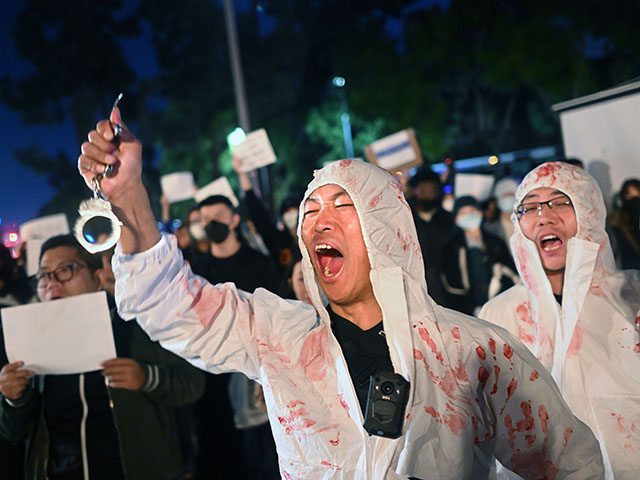A court in Shanghai on Monday sentenced filmmaker Chen Pinlin to three and a half years in prison for making a documentary about the massive nationwide protests against China’s coronavirus lockdowns in 2022.
Chen, 33, was arrested in January 2024 soon after posting his film “Urumqi Middle Road” to the Internet. Urumqi is the capital city of the East Turkestan region, which the Chinese Communist government refers to as Xinjiang province – home of the ruthlessly oppressed Uyghur Muslims.
Urumqi Middle Road was ground zero for the protest movement that came to be known as the White Paper Protests, named after the way participants would wave blank sheets of paper in lieu of protest signs.
Holding up blank papers or signs, a technique pioneered by the Hong Kong pro-democracy protesters of 2019, is a way of daring the authorities to arrest you for saying nothing at all. It also dramatizes the way dissent is silenced by the authoritarian regime in Beijing.
The Chinese police state very often takes that dare, but the White Paper Protest ended up as a very rare win for the Chinese people against their rulers. The protest began when a fire in an Urumqi apartment building killed at least ten people, in part because coronavirus lockdown protocols prevented firefighters from helping people who were trapped inside.
Dictator Xi Jinping’s subjects were already very weary of his insane and brutal citywide coronavirus lockdowns, so the Urumqi deaths touched off a powder keg of unrest. The demonstrations quickly swelled to astounding size in cities across China, to the evident surprise of officials who underestimated how much the residents of other cities would care about a disaster in the Uyghur capital.
When the protests reached Beijing, the police broke them up with pepper spray and vicious beatings – but the protesters kept coming back. Chinese Communist Party censors labored frantically to delete videos of the marches, but there were too many videos and social media posts for them to manage, and people found clever ways to get around content bans.
The protests died off after a massive police crackdown but, in December 2022, the Communist regime ended Xi’s lockdowns and promised nothing like them would happen again. The regime has since decided to erase all memory of the protests, much as it has erased events like the Tiananmen Square massacre from history books.
Chen’s “crime” was remembering that which Beijing has decreed must be forgotten. He said he was especially determined to counter the regime talking point that the White Paper Protests were organized by hostile “foreign forces,” rather than being a genuine grassroots movement. As a White Paper demonstrator himself, he knew that was not true.
“I hope to explore why, whenever internal conflicts arise in China, foreign forces are always made the scapegoat. The answer is clear to everyone: the more the government misleads, forgets, and censors, the more we must speak up, remind others, and remember,” Chen said when he posted his film online.
“Only by remembering the ugliness can we strive toward the light. I also hope that China will one day embrace its own light and future,” he said.
The alternative English title for Chen’s documentary is “Not the Foreign Force,” stressing his emphasis on showing that the White Paper Protests were organic.
Chen was charged with “picking quarrels and starting trouble,” China’s all-purpose allegation for locking up dissidents, held in pretrial detention since January 2024, and sentenced on Monday after a three-hour trial behind closed doors.
International press freedom and human rights groups have demanded Chen’s release, including Amnesty International, Reporters Without Borders (RSF), and the Human Rights Research Center.
“Documentary filmmaker Chen Pinlin was only serving the public interest by documenting historic protests against censorship and abuses by the Chinese regime. By branding him a troublemaker, Beijing demonstrates its utter contempt for the right to information,” said RSF Asia-Pacific Bureau Director Cedric Alviani.
RSF noted China is “the world’s biggest prison for journalists and press freedom defenders with 124 media workers currently behind bars.” China ranks 172nd out of 180 countries in RSF’s World Press Freedom Index for 2024.
Chinese human rights watchdog Weiquanwang said on Tuesday that Chen has been “treated extremely inhumanely in the detention center” in Shanghai, where he was held for over a year before his sentencing.
